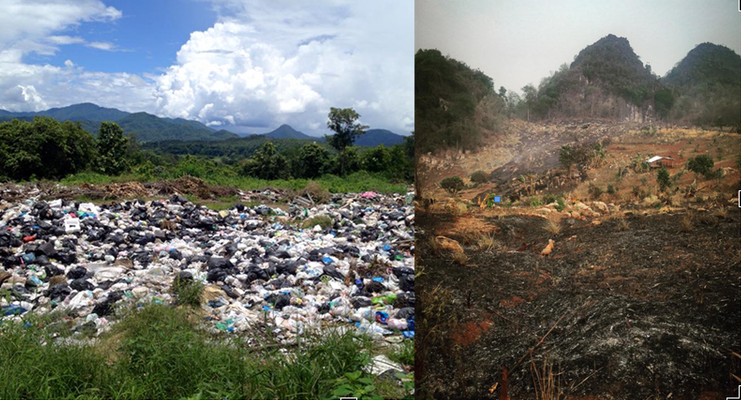It wasn’t until I saw the swimming pool-sized pit of garbage burning in front of me—the twisting of the plastic bags, the slow curling and melding of the styrofoam containers, the square tupperware boxes that seemed to shrink away to nothingness as the flames engulfed them—that it truly hit me.
This garbage was being burned as a way of disposal. Garbage I had contributed to.
This is my fourth burning season here in Pai, Thailand, and it only seems to get worse each year the more I learn about it.
It’s easy for a Westerner to come along on their high horse and cry outrage at this monstrosity—(these people are burning their garbage! Why don’t they have a garbage truck come pick it up? Where are their recycling systems?)—that’s certainly what I did the first year I learned about this.
For most of the year, Pai, a small valley town in the Northern Thai mountains a few hours out of the larger city of Chiang Mai, is a beautiful, peaceful place. The air is fresh, mornings are cool and misty, and as the sun rises the fog melts away in minutes (depending on the season). Lazy, meandering rivers snake through the rolling farmland which covers much of the land, and the content, easy-going town is surrounded by lush green mountains with many waterfalls tucked away for the adventure-seeking explorer to find.
It’s the town that I fell in love with eight years ago and haven’t been able to leave.
But one of the main reasons I only live there for part of the year is because of burning season.
This happens every year between February and April, both in Northern Thailand and some of the neighbouring areas. Farmers set fire to the previous year’s crops as the most cost-effective way of managing their agricultural waste to clear the ground for next year. Tree lines are also set alight as a way to clear space.

Unsurprisingly, air pollution from this practice creates widespread health problems. The most common health occurrences in the North include cancer of the trachea, bronchi, and lungs—all of which health professionals suspect are linked to annual and prolonged smog exposure.
From my last decade living in Thailand, I agree with an article published online, that burning as a means of waste disposal appears to largely to be a socially and culturally accepted practice and can’t be attributed solely to economic influences:
During a trip to the Lod Caves located just outside of Thailand’s Mae Hong Son Province, the driver of our vehicle made a few jokes about the multiple forest fires we encountered along the way.
“I don’t have a lighter, but I wish I did so I could burn this part down,” he said as he pointed at a lush section of forest. “It is very good for hunting pigs if there is no forest and I want to help my friends.”
Hearing this comment made me realize this issue is far more extreme than any government regulation can ever control. It’s a cultural belief; something that I don’t feel comfortable criticizing. What I can say, however, is that I believe something needs to be done. Although trees play a crucial role in human civilization, I wonder if most of mankind is aware of the damage that has been done over the years.
Burning happens frequently on smaller scales throughout Northern Thailand at all times of the year as well. Households commonly dispose of their everyday garbage by setting it alight. Many Thai operated guesthouses, restaurants, and other tourist related centers—who in contrast to the farmer with limited financial resources have a sustained way of earning income—also use burning as the most “convenient” way to get rid of their garbage.

This being said, as awareness of the issue increases each year, there have been more and more demonstrations and protests by the Thai community about organized regulation on air quality control in the country.
Though there are clearly large cultural influences at play in Thailand, in my my naivety, it was not until speaking with my brother who works in the waste management industry in British Columbia that I learned that burning as a means of waste disposal happens not only in less developed countries but is also common in rural northern communities in many Canadian provinces whose government waste management resources are limited. I was shocked to to learn that burning garbage happens in my native country which I considered so “clean and green.”
But regardless of what power we may have over government—foreign or otherwise—one of the biggest things we can do about it is spread awareness and produce less garbage.
Here are nine easy tips to reduce our waste:
Consciously refuse single use items—plastic bags, straws, take away containers—you name it.
1. Use re-usable canvas bags (and make sure you always have one on hand). Use cotton or mesh bags for produce and bulk items. And not just for groceries either—have a pocket-size bag whenever you’re going out.
Golden rule: stop using plastic bags. If you forget your fabric bag, don’t buy it or carry your stuff without one.
2. Always have a coffee/tea thermos when you’re out. And think ahead: When we’re leaving the house in the morning and don’t have a lunch with us, it’s pretty obvious we’re going to have to buy something—so grab a container and some cutlery.
3. Keep a couple “to go” kits in the car with your fabric bags. If you’re buying something simple like a piece of pizza or a muffin that you’ll eat right away, just ask for it in your hand.
Practice seeing all things from a circular mindset. How can the item continue to live and provide purpose?
4. Recycle. Have bins for newspaper, mixed paper, cans and bottles next to each other in the kitchen (or the place that’s easiest to toss things).
5. Compost. This is the single most effective way to cut our garbage output. According to the David Suzuki Foundation, roughly 40 percent of the waste in our landfills is compostable organic matter. That’s crazy! If we compost properly, composts don’t smell and we can cut our trips to take out the garbage in half.
6. Upcycle things we might normally throw away. Old jars can be made into food storage or gift containers (plus they make everything look better!). Old wine bottles could be upcycled as vases. Gifts can be re-given to someone who would appreciate them. If we approach our possessions with a circular mindset we can drastically cut our waste output.
Consume consciously.
7. Pause before buying things. Is what we’re buying meaningful in some way? Does it add value to our life? Do we truly love it? Or are we just impulse buying or jumping on a sale while we can? If it’s something truly necessary, is there something similar we already have that we can modify to meet our need? Can we recycle or donate our old version?
8. Do frequent “stuff purges” in our homes and look for ways to minimize our possessions. Most of us have far more than we need. Is there stuff we don’t use (but keep anyways) that we can sell? Or donate to someone who would actually need and use it?
9. Appreciate simplicity. If we truly value the things we have, less is indeed more.
It is not only about responsible ecotourism, but responsible ecoliving. Being mindful of our impact on the earth regardless of where we find ourselves on it.
Though I like to think that I’m someone who produces less waste than the average person, passing by that swimming pool-sized burning pit of garbage that day—the acrid smell of suffocating, black smoke rising up in the air so thick I felt the nausea in pummeling punches in every part of my body—was a stark reminder that we can always do better.
We are but guests on this planet; it is up to each and every one of us to do our part.
~
~


Smoke: A Crisis in Northern Thailand

~
This film was presented as a work in progress at Chiang Mai University’s Faculty of Agriculture on January 8th, 2016 to create awareness and begin a dialogue about the yearly smoke crisis in Northern Thailand.
Learn more here:
“Authorities have misled people” about health peril of air pollution.
“You shouldn’t be breathing air that could be killing you.”
Be part of the solution:
A Circular Economy and the Zero Waste Mindset.
Top 12 Tips to Save the Planet.
~
Author: Michelle Amanda Jung
Image: Author’s own, Smoke The Documentary
Editor: Lieselle Davidson
Copy Editor: Yoli Ramazzina







Read 0 comments and reply